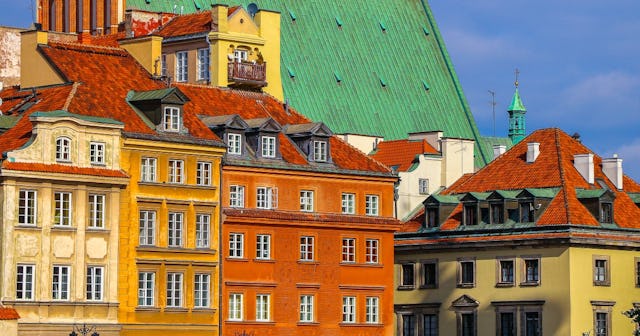60+ Of The Most Popular Polish Last Names (With Meanings And Origins!)

Polish last names, like many others in the region, tend to be based on occupations/jobs, places, or nicknames. Etymologically speaking, these three categories are known as cognominal, toponymic, and patronymic, respectively. Around the 13th century, it became trendy for people to add the suffix -ski (which means “of”) to their last names. It still remains one of the biggest clues that a name is Polish — roughly 35 percent of the 1000 most popular Polish surnames have the -ski suffix. Between the 15th and 17th centuries, most people had three names: a given name, a clan name, and a last name. Then, between the end of the 17th century and mid-19th century, most of the population dropped their clan names, with the focus then placed on the family name; many of which remain.
You’ll also see Slavic names among Polish last names. Legend has it that when these names were given, the bearer was meant to fulfill the prophecy of the name’s meaning. But when a ban on pagan names was imposed with the Council of Trent, these old Slavic names — and their suffixes used to create surnames — all but died out. As is true with naming in many cultures, though, trends and customs have seen several evolutions over time. In the 19th century, Poles reclaimed the old Slavic names and suffixes out of patriotism. Some of these are still in use today.
It’s no wonder that Polish last names are popular — it’s a fascinating region and culture. Did you know that Poland is the ninth largest country in Europe? But that isn’t the only cool thing you should keep in mind about this Eastern European nation. For one, it shares a border with seven other countries including Russia, Lithuania, Belarus, Slovakia, Ukraine, the Czech Republic, and Germany. (That’s a lot of neighbors!) Its official name is the Republic of Poland and, within their culture, they value health, faith, adaptability, generosity, justice, nobility, tradition, stoicism, sentimentality, and optimism.
Do you want to learn more last names from other countries? We’ve gathered surnames from around the world to satiate your curiosity. Check out our bounty of Spanish, Mexican, and Brazilian last names!
Poland is a vast country filled with millions of people with a million stories. Last names can give you a glimpse of that. Ready to learn more? Check out some of the most popular Polish last names, along with their meanings and origins.
- Adamik
Meaning: Man Origin: Hebrew
- Andrysiak
Meaning: Son of Andrzej Origin: Polish
- Adamski
Meaning: Someone from Adamy, a village in Poland Origin: Polish, Jewish, Ashkenazic
- Antol
Meaning: Precious Origin: Latin
- Augustyn
Meaning: Augustinus; exalted, majestic, or venerable Origin: Polish, Latin
- Bartosz
Meaning: Son of Talmai or son of Furrows Origin: Polish
- Bosko
Meaning: Barefoot Origin: Polish, Slovak
- Broz
Meaning: Immortal Origin: Polish
- Brzezinski
Meaning: Birch forest Origin: Polish
- Budny
Meaning: Hut, cabin Origin: Polish
- Bukoski
Meaning: Someone who belonged to the town of Bukowo Origin: Polish
- Chlebek
Meaning: Bread Origin: Polish
- Chmiel
Meaning: Someone who grows hops (the plant used to brew beer) Origin: Polish
- Czajka
Meaning: Lapwing bird Origin: Polish
- Czajkowski
Meaning: Someone who belongs to the village of Czajkow or any other place with a name starting with the word Czajk Origin: Polis
- Dabrowski
Meaning: Oak grove Origin: Polish
- Dudek
Meaning: A crested Old World nonpasserine bird Origin: Polish, Ukrainian, Czech, Slovak
- Dziedzic
Meaning: Landowner Origin: Polish
- Gorecki
Meaning: Mountain Origin: Polish
- Jabłoński
Meaning: Apple tree Origin: Polish
- Jagoda
Meaning: Berry Origin: Polish
- Jankowski
Meaning: Someone from Jankow Origin: Polish
- Jaworski
Meaning: Maple; someone from Jawory Origin: Polish
- Kaczka
Meaning: Duck Origin: Polish
- Kaczmarek
Meaning: Innkeeper Origin: Polish
- Kaminski
Meaning: Stone, rock Origin: Polish
- Kowalski
Meaning: Blacksmith Origin: Polish
- Kozlowski
Meaning: From the town of the goat Origin: Polish
- Król
Meaning: King Origin: Polish
- Kwiatkowski
Meaning: Flower; someone from Kwiatkow Origin: Polish
- Laska
Meaning: Grace, mercy Origin: Polish
- Lewandowski
Meaning: Lavender Origin: Polish
- Majewski
Meaning: Someone from Majewo Origin: Polish
- Malinowski
Meaning: Raspberry; someone from Malinow in Poland or Malinov in Ukraine Origin: Slavic
- Nosek
Meaning: Small nose Origin: Polish
- Nowak
Meaning: New Origin: Polish
- Olszewski
Meaning: Someone from Olszewo Origin: Polish
- Pawlak
Meaning: Little Origin: Polish
- Raatz
Meaning: Wise, just man; counsel, advice Origin: Polish, German
- Raba
Meaning: Teacher Origin: Polish
- Rabarchak
Meaning: Son of the rabbi Origin: Polish
- Rabinowitz
Meaning: Son of the rabbi Origin: Polish-Lithuanian Ashkenazi Jewish
- Rach
Meaning: Rough, stiff Origin: Polish, German
- Rachman
Meaning: Merciful Origin: Polish, Jewish
- Rachowski
Meaning: Someone from Rakowo Origin: Polish
- Racki
Meaning: Someone from Radzie in Bialystok and Suwalki voivodeships. Origin: Polish
- Ryba
Meaning: Fisherman Origin: Polish
- Sniegow
Meaning: Person from a place with snow Origin: Polish
- Stępień
Meaning: A plodder, someone with a slow gait Origin: Polish
- Szymanski
Meaning: Someone from Szymany in Konin or Lomza Voivodeships Origin: Polish
- Wiater
Meaning: Wind Origin: Polish
- Wiśniewski
Meaning: Cherry; someone from Wisniewo Origin: Polish
- Witkowski
Meaning: To guide the people; someone from Witkowo Origin: Polish
- Wojciech
Meaning: Warrior, war Origin: Polish
- Wojciechowski
Meaning: Someone from Wojciechowo Origin: Polish
- Wójcik
Meaning: Son of Wójt Origin: Polish
- Wozniak
Meaning: Caretaker Origin: Polish
- Wróbel
Meaning: Sparrow Origin: Polish
- Zabek
Meaning: Tooth Origin: Polish
- Zając
Meaning: Hare Origin: Proto-Slavic
- Zieliński
Meaning: Green Origin: Polish
This article was originally published on